
Outbreak READY! Simulations
Travel to the fictional country of Thisland and test your knowledge and skills in outbreak preparedness and response using the Center for Humanitarian Health's award-winning digital outbreak simulations:
Outbreak READY! and Outbreak READY 2!: Thisland in Crisis.
Outbreak READY! Simulations: Overview
What are the simulations?
Developed by the READY initiative, the Outbreak READY! Digital Readiness and Response Simulations aim to strengthen the operational and health technical readiness of non-governmental organizations (NGOs) to respond to large-scale infectious disease outbreaks in humanitarian contexts. Utilizing a computer-based serious game that brings the complex nature of a humanitarian outbreak response to life, they allow participants to test and refine their outbreak readiness skills and knowledge.
The simulations follow evolving outbreaks from the first detection of a disease to its spread throughout the population and are designed for humanitarian practitioners working for national and international NGOs responding to outbreaks in humanitarian settings. In both simulations, players take the role of a humanitarian team member for a medium-sized, international NGO named READY. The NGO operates in Thisland, a fictitious, low-income country that has experienced recent civil conflict and mass displacement.
Who are the simulations for?
The simulations are primarily designed for national and international NGOs operating in humanitarian context. The first simulation, Outbreak READY!, targets NGO leaders and managers from both operational and programmatic backgrounds across all sectors. Outbreak READY 2!: Thisland in Crisis targets NGO health program managers/coordinators, RCCE focal points, and other humanitarian health staff/supervisors. However, while the simulations were originally intended for NGO staff, other groups (including ministries of health, UN agencies, and academic institutions) have found them to be useful training tools for their staff and students.
Do the simulations come with accompanying resources?
Both simulations have an accompanying Solo-Play Guide and Facilitation Manuals for group play events.
The Solo-Play Guide supports people who are playing the simulation individually. It provides an overview of the simulation, tips on navigating the tool, and reflection questions.
The Facilitation Manuals for group events provide detailed guidance on how to organize and facilitate a simulation event in a group setting. For example, it includes checklists on how to prepare facilitators, participants, and materials; how to structure the timeline of an event; proposed discussion questions; and additional supporting materials.
Which simulation is right for me?
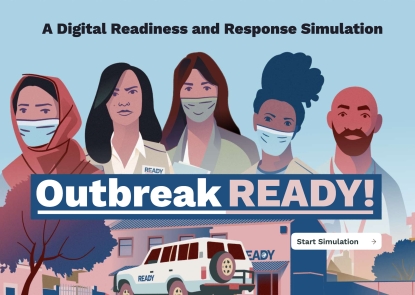
Outbreak READY!
Overview: Players take the role of a Team Lead managing a multi-sectoral humanitarian program portfolio for the NGO READY. As Team Lead, they must make decisions that determine how the NGO adapts and expands programs to respond to the outbreak with a focus on how operational readiness actions influence response outcomes.
Audience: NGO leaders and managers from both operational and programmatic backgrounds across all sectors
Approximate Duration: 2 hours and 30 minutes
Languages: English, French, Spanish
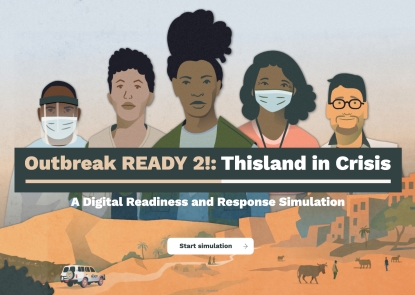
Outbreak READY 2!: Thisland in Crisis
Overview: Players take the role of a Health Program Manager leading the health response for the NGO READY. As Health Program Manager, they must identify, assess, and interpret sources of data to plan and implement an integrated outbreak response that prioritizes risk communication and community engagement, protection principles, and staff safety and wellbeing.
Audience: NGO health program managers/coordinators, RCCE focal points, and other humanitarian health staff/supervisors
Approximate Duration: 3 hours and 30 minutes
Languages: English, French
Note: While the events of Outbreak READY 2!: Thisland in Crisis chronologically occur after those in Outbreak READY!, the simulations are independent of each other. You do not have to play Outbreak READY! before playing Outbreak READY 2!: Thisland in Crisis.
How can I use the simulations?
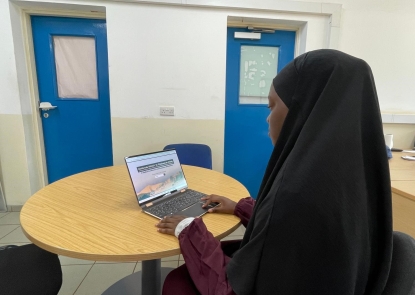
Individuals
Individuals can play the simulations on their own using the Solo-Play Guides. They can play the simulations all at once, or divided up throughout their week.
Each simulation's Solo-Play Guide supports people who are playing individually. It provides an overview of the simulation, tips on playing like the recommended time per chapter, and reflection questions.
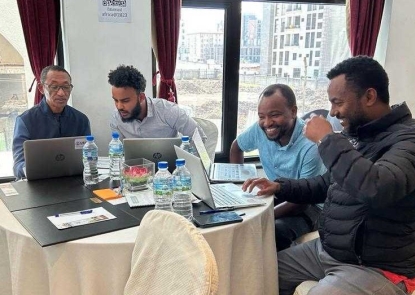
NGOs
NGOs can use the simulations in two key ways: (1) by distributing the simulation to any interested staff for solo-play (see Individuals), or (2) by organizing a facilitated group event.
During a facilitated group event, staff can play the simulation and have critical discussions about key questions and challenges that arose. The Facilitation Manuals for group events provide detailed guidance on how to organize and facilitated a group simulation event. Simulation events have been conducted with NGOs around the world, including in Sudan, South Sudan, Ethiopia, Somaliland, Nigeria, Cameroon, Iraq, and Turkey.
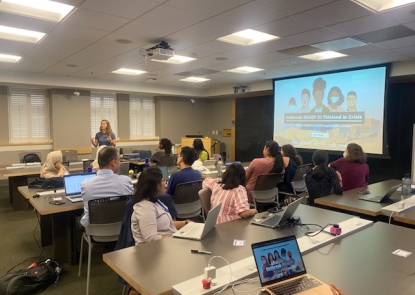
Academic Institutions
Academic institutions can distribute the simulation to interested students for solo play, organize a simulation event, or incorporate the simulations into their lesson plans.
Institutions including Yale University, Columbia University, Harvard University, the University of Geneva, McGill University, the Prasanna School of Public Health, and of course, the Johns Hopkins Bloomberg School of Public Health, have all used the simulations in their classrooms.

The simulations were made possible by the generous support of the American people through the United States Agency for International Development (USAID). The contents are the responsibility of READY and do not necessarily reflect the views of USAID or the United States Government. Led by Save the Children, the READY initiative is implemented in partnership with the Johns Hopkins Center for Humanitarian Health, the Johns Hopkins Center for Communication Programs, UK-Med, and the Humanitarian Leadership Academy. READY is augmenting global capacity for non-governmental organizations to respond to large-scale infectious disease outbreaks.
